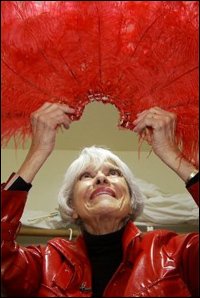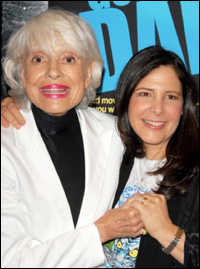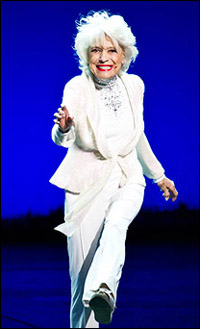
*
Berinstein's Broadway producing credits include Legally Blonde, Enchanted April, Thoroughly Modern Millie, The Crucible, One Flew Over the Cuckoo's Nest, Fool Moon and Golden Child. Her 2007 film, "Show Business: The Road to Broadway," documented the path of four musicals in 2004: Wicked, Avenue Q, Taboo and Caroline, or Change.
"Carol Channing: Larger Than Life" (released in Los Angeles Jan. 20 and opening in New York City and elsewhere Feb. 3) captures the Tony Award-winning star at age 89, reflecting on her two major stage roles — Dolly Levi in Hello, Dolly! and Lorelei Lee in Gentlemen Prefer Blondes — and vivaciously sharing her passion for (and some regrets about) the theatre. Also captured is her fall 2010 appearance as a special guest star in Gypsy of the Year — the first time in 16 years that she performed on a Broadway stage.
Friends and colleagues, including songwriter Jerry Herman, dancer Marge Champion, actress Betty Garrett, costume designer Bob Mackie and more, talk about Channing's life and work in the film. Surprisingly, the centerpiece of the picture is her late-life romance with childhood sweetheart Harry Kullijian. Separated in their teens, they reunited after 70 years, as octogenarians, and married. (Sadly, Kullijian died in December 2011.)
We caught up with Berinstein, a Los Angeles native who is based in New York City, by phone from L.A., where her picture was about to open.
| |
 |
|
| Carol Channing in "Larger Than Life." | ||
| Dramatic Forces |
Dori Berinstein: Yes. I think that's very much what compelled me to think that it might be a feature and not just a short portrait of her professional life. Oh my goodness, it's such a beautiful, romantic story. And they were so adorable together. It was an inspiring relationship. I hope the take-away is that dreams can come true and good things are worth waiting for — a positive, inspirational message.
When did the idea of the film come to you? Why Carol?
DB: Well, I had the amazing good fortune of becoming friendly with Carol — Carol and Harry — and we would have dinners, and, over dinner, she would tell these just jaw-dropping stories about her life. I felt this responsibility to capture these stories. I didn't know in the beginning that I was embarking on a new feature film. I just really wanted to get this footage…and then the thing evolved. Carol was still going strong performing. And all the work that she and Harry had been doing with her [arts education] foundation was just so inspiring. I happened to ask over dinner one night how Carol and Harry met, and it was this beautiful, beautiful story. I felt that there really was something in here that was a story that should be told on screen.
Not to reduce her, but she is primarily known for only two stage shows and one film ["Thoroughly Modern Millie"]. It's not like she consistently worked for a 50-year period in hit after hit after hit. She was devoted to Dolly!, Blondes and her own persona, via her concert appearances.
DB: Absolutely. But you know what? In talking with her, before I started shooting with her, what came through so loud and clear was this incredible work ethic — this commitment to the craft. She is such a role model to the next generation of performers: her work ethic and her love of theatre and just her appreciation of all aspects of it, [like] staying up all night with the crew as they are loading out to go to the next town, and how she feels a responsibility to be on the road with a touring show. You know, that's such a rare thing for a star now. These, to me, [are] important theatrical life lessons for the next generation.
She was committed to the theatre at her own peril, as she tells us — it affected her relationship with her son, and she risked her health on the road. She had chemotherapy treatments for ovarian cancer while she was on the road with Dolly!
DB: Yes, and nobody knew at the time. But that didn't stop her, you know. She felt this huge responsibility to the audience, and she was not going to let them down. Nothing was going to interfere. Wow. I mean, it's a stunning commitment, and I wanted to celebrate that and share that.
Did you first meet her when you were putting your earlier film, "Show Business," together?
DB: No. I met her soon after that. We met through theatre a number of times. The first time I met her was at the stage door when I was seven years old. [Laughs.] …When she was on tour with Hello, Dolly! But, more recently, she came to several of the shows that I've had on Broadway, just as a member of the audience, and I met her backstage, I met her at various events. I started to get to know her, but it really was being at a dinner with her and sitting next to her — we just connected and ended up spending a lot of time together. Having dinners together, that's how it all began.
Was it hard to get her to agree to the film? Were there ground rules going in?
DB: No ground rules at all. She never saw anything until the final film was completed. At the time I asked to start shooting with her, I think we really had established this trust, and she was familiar with some of my work and she obviously knew my theatre history as a producer, and, I think, she was very comfortable with my capturing her stories. But there were no rules and there wasn't anything that was off limits.
She doesn't talk on camera about her unhappy marriage to Charles Lowe. I don't think she talks about him at all, does she? Did you ask?
DB: No. [Laughs.] She refers to it as a horrible marriage at one point, but…Carol really is the most positive person that I've ever met in my entire life, and she has only wonderful things to say about everybody and seems to block out the painful moments in her life and really focuses on the positive. I think that that kind of personality — that kind of ray of light — has given her so much strength, and probably is why she continues at 91 to be going so strong. She's positive and forward-thinking. I did ask.
Were there times when you asked about something sensitive and she said, "Oh, Dori, I don't want to talk about that"?
DB: [Laughs.] Never. She never said that. She tried to answer everything I asked, but…the answer ended up segueing very quickly into something else, and I don't think that was intentional. I think that those memories and that kind of dwelling on [the] negative is not where her mind is. It's not who she is. She wasn't hiding anything from me.
There's a very candid section in the film where she talks about her son, Channing Lowe, and admits, "My son took a backseat" — and that theatre is a "selfish" life. You can see, behind her eyes, something very painful.
DB: Yeah.
Did I misread that?
DB: No, I think that's absolutely true. And, you know, there's a lot of sacrifice in being on the road and trying to do that while raising a family.
Did you reach out to Channing?
DB: Oh, yes. Chan is this incredible, award-winning cartoonist, but he has said, and he told us, that he did not inherit his mom's comfort in front of an audience and in public, and he's much more comfortable leaving that to her. And so, while he was very supportive of the film, he didn't want to be on camera.
Do they have a relationship?
DB: Yes. They've been in very close touch — particularly with Harry passing away.
| |
 |
|
| Carol Channing and Dori Berinstein |
DB: [Laughs.] No. I really think that the Carol you see on stage is very much the Carol you see off stage. She is just so full of life and so positive and funny and brilliant and, you know, so clever, and that is who I have dinner with. [Laughs.] It's very much the same person. Obviously, when we are having a relaxing dinner, [I'm] not pushing her to answer tough questions, but it's the same Carol.
What was the hardest part of the investigation of her, for you?
DB: Well, it really was such a challenge to figure out how to weave two storylines — what to include and what not to include. We had so much material, and there are magical moments that are on the cutting room floor, so to speak, because people don't go to five-hour movies, unfortunately. That was so hard to both tell the story of this extraordinary career and also weave together this beautiful love story. There are great moments of her professional career on film — stories by wonderful people we talked to. Many will be on the DVD.
There's that lovely moment in the film where she and Harry are in a limo in Times Square and he talks about being on leave from the service during the Korean War, when she was in Gentlemen Prefer Blondes, and he says he almost stopped by her theatre. She is mournful, saying, "Oh, how I wish you had."
DB: [Laughs.] Yes.
| |
 |
|
| Channing at the 2010 Gypsy of the Year competition. | ||
| photo by Krissie Fullerton |
DB: It is. And, it's real. Oh my gosh, their relationship was so powerful. They were like teenagers in love, you know. It was just beyond adorable, and you could tell the connection. Even though there was a 70-year gap, a day really didn't pass. They just picked up right where they left off. Did she talk more about her parents than what we see on film?
DB: Oh, yeah. Yeah. She seemed to be particularly close with her father. She talks about her father all the time. I just had a wonderful brunch with her on Sunday, and she was talking quite a bit about her mother, actually. She loved her parents, and, I think, when you think about the time in which she grew up, to have parents that were so supportive of the path that she wanted to pursue — that was, I would imagine, an unusual thing for that time, but she had their backing.
How is Carol doing?
DB: Well, it's an extremely difficult time, as you can understand, particularly, having lost Harry — but, she's doing very well. It was wonderful to see her, and she looked great. And, under the circumstances, I think she's doing very well.
Is it overstating it to say that you're kind of a surrogate daughter to her?
DB: [Laughs.] We're very close. She decided that she is my children's spiritual grandmother, and they think of her that way.
Why don't we have creatures in show business anymore?
DB: Creatures?
Yeah. Carol Channing is a creature. She's called a "creature," I think, by one of your sources.
DB: [Laughs.] She is!
Did show business lose its taste for people who are unique?
DB: Jerry Herman and others certainly wrote extraordinary roles for women back in the day. There isn't as much of that kind of show being created right now, so I think that has something to do with it, but, yes. [Laughs.] I love what Bob Mackie [said] about her: "You don't say, 'Get me a Carol Channing type,' because there isn't anybody else like her!" She is really one-of-a-kind, and that's one of the reasons why I felt it was so important to tell her story.
(Kenneth Jones is managing editor of Playbill.com. Follow him on Twitter @PlaybillKenneth.)









